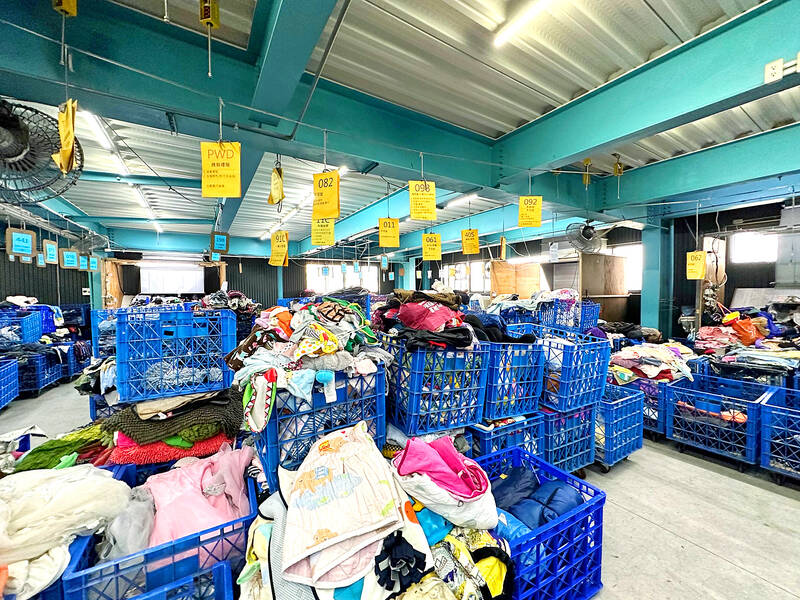The Ministry of Environment is drafting measures to encourage clothing brands to use singular and recyclable materials, as well as establishing a “clothing-to-clothing” chemical recycling model as textile waste fast fashion exacerbates the problem of textile waste.
Domestic used clothing stations across the nation saw volumes increase from about 37,000 tonnes in 2013 to 82,000 in 2022, ministry data showed.
About 36 percent of the used clothes went straight to incinerators, 22 percent were downcycled and 42 percent went to second-hand donation facilities, the ministry said.

Photo courtesy of the Ministry of Environment
Taiwan can recycle used clothing fibers and use those fibers to make new clothing, but the process is more complicated if the clothes used multiple materials, Lee Yi-hua (李宜樺), head of the ministry’s Sustainable Consumption and Recycling Division, said on Saturday.
The ministry is trying to encourage clothing brand manufacturers to begin using single types of materials, preferably recycled materials, when making clothing items, Lee added.
The ministry is also urging clothing distributors to offer recycling, remaking or “shared clothing” services, and is mulling a general ban on distributors destroying any excess clothing in storage, he said.
It also hopes that distributors would be willing to sell second-hand clothing, he added.
The ministry is considering standards, to be available as early as next month, that would offer official suggestions for “green” clothing options for sectors that need to place large orders for uniforms, such as banks or transportation companies.
However, Shu-Te University Department of Fashion Design professor Chu Wei-cheng (朱維政) said that making clothing entirely from one material was more difficult.
Blending polyester fibers and cottons makes for more comfortable and fashionable wear, Chu said, adding that clothes often need to include metallic objects in the form of buttons or zippers.
The clothing recycling industry would only benefit when polyester fibers become as skin-friendly as 100 percent cotton materials, absolving the need to mix fabrics, he said.
Asked for comment, clothing manufacturers said there are multiple processes involved when a piece of clothing is recycled, meaning that recycled materials are about 30 percent more expensive than original materials.
Consumers might not be as willing to buy clothes when that cost is reflected in the selling price, a manufacturer said, adding that sourcing enough used clothes for a “clothing to clothing” recycling system might be a problem.
Despite the difficulties, clothing manufacturers beginning to incorporate recycled materials is an international trend, and the clothing industry would have to come up with solutions to address the issue, the manufacturer said.

TRAFFIC SAFETY RULES: A positive result in a drug test would result in a two-year license suspension for the driver and vehicle, and a fine of up to NT$180,000 The Ministry of Transportation and Communications is to authorize police to conduct roadside saliva tests by the end of the year to deter people from driving while under the influence of narcotics, it said yesterday. The ministry last month unveiled a draft of amended regulations governing traffic safety rules and penalties, which included provisions empowering police to conduct mandatory saliva tests on drivers. While currently rules authorize police to use oral fluid testing kits for signs of drug use, they do not establish penalties for noncompliance or operating procedures for officers to follow, the ministry said. The proposed changes to the regulations require

The Executive Yuan yesterday announced that registration for a one-time universal NT$10,000 cash handout to help people in Taiwan survive US tariffs and inflation would start on Nov. 5, with payouts available as early as Nov. 12. Who is eligible for the handout? Registered Taiwanese nationals are eligible, including those born in Taiwan before April 30 next year with a birth certificate. Non-registered nationals with residence permits, foreign permanent residents and foreign spouses of Taiwanese citizens with residence permits also qualify for the handouts. For people who meet the eligibility requirements, but passed away between yesterday and April 30 next year, surviving family members

Taipei, New Taipei City, Keelung and Taoyuan would issue a decision at 8pm on whether to cancel work and school tomorrow due to forecasted heavy rain, Keelung Mayor Hsieh Kuo-liang (謝國樑) said today. Hsieh told reporters that absent some pressing reason, the four northern cities would announce the decision jointly at 8pm. Keelung is expected to receive between 300mm and 490mm of rain in the period from 2pm today through 2pm tomorrow, Central Weather Administration data showed. Keelung City Government regulations stipulate that school and work can be canceled if rain totals in mountainous or low-elevation areas are forecast to exceed 350mm in

China Airlines Ltd (CAL) yesterday morning joined SkyTeam’s Aviation Challenge for the fourth time, operating a demonstration flight for “net zero carbon emissions” from Taiwan Taoyuan International Airport to Bangkok. The flight used sustainable aviation fuel (SAF) at a ratio of up to 40 percent, the highest proportion CAL has achieved to date, the nation’s largest carrier said. Since April, SAF has become available to Taiwanese international carriers at Taipei International Airport (Songshan airport), Kaohsiung International Airport and Taoyuan airport. In previous challenges, CAL operated “net zero carbon emission flights” to Singapore and Japan. At a ceremony at Taoyuan airport, China Airlines chief sustainability